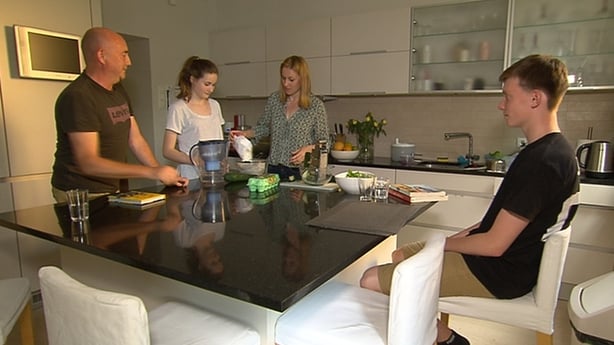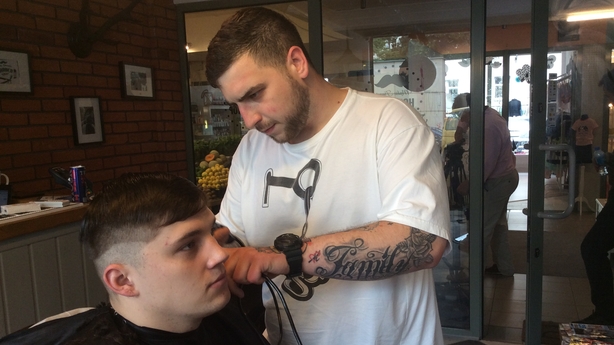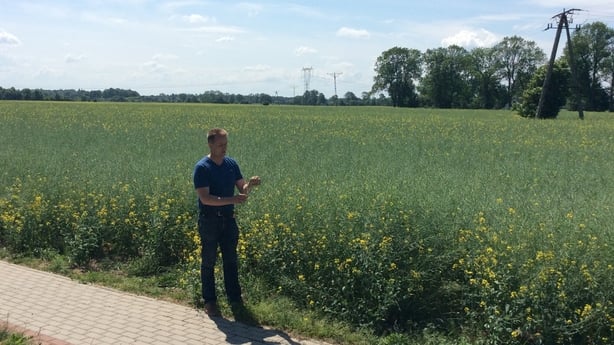"The Irish and the Poles get on so well together", Ireland's ambassador to Poland Gerard Keown tells Carole Coleman on day one of her trip to Poland.
I can't help thinking that a diplomat would say that. But within a day of arriving in Warsaw myself and cameraman Michael Cassidy are finding out for ourselves that the ambassador is absolutely right.
This reporting is supported by the Global Irish Media Fund.
Officially there are about 2,000 Irish people in Poland. They are spread across Krakow, Łódź, Gadansk in the north, Katowice near the Czech border as well as smaller out-of-the way places. What I found is that most are Irish men who came to Poland for work or stayed for love.
Dubliner Michael Kenny arrived from Dublin in the 1990s on the advice of friends working in the newly opened Polish market. "They rang me and said: 'Mike you have to get over here, cheap beer, gorgeous girls, a great place to be!" Three years later Mike had met and married his wife Iwona.
At their home in Warsaw's Balaton neighbourhood, artist Iwona shows me paintings inspired by the Irish landscape. Teenaged children Mieszko and Alicja float in and out keeping an ear on our conversation. Both were born in Dublin where Michael and Iwona moved to before coming back to Poland.

"We were looking at homes in Dublin for €600,000." Mike says explaining the decision to settle to Poland,
"For €200,000 we have the same home here." The central European location also worked well for his mobile technology company.
As an Irish-Polish family the Kennys are steeped in both cultures - the only gap being Michael's sparse use of the Polish language. "I wish my husband would speak more Polish," Iwona laments explaining that she speaks English with Michael and Polish with the children.
But the linguistic deficiencies of Irish men it seems are no barrier to the many Polish-Irish love matches.
"They look after themselves and they look after their men well," Mike says of the Polish girls. His wife repays the compliment saying that Irish men are not spoiled. "They are brought up differently than Polish men,” she says.
So do their children feel more Irish or Polish? "We always used to say that I'm 99% Polish and 1% Irish, and Mieszko is 99 % Irish and 1% Polish." Alicja tells me, "But I think I'm 50/50."
Poles Returning Home
Aside from the Irish in Poland, cross-cultural links are further boosted by the estimated 150,000 Polish people living and working in Ireland. Most arrived during the Celtic Tiger years 2003-2007 and while many remain, others have returned to Poland.
The Polish economy escaped the worst of the global recession. Though average monthly wages are about 2,000 Zloty (€600) Poland's cost of living is much lower.
In a small strip mall in the centre of Warsaw I meet Piotr Brzoztek shaving a customer at the Hop Chop barber shop. Piotr speaks with an Irish accent acquired during his three years in Mullingar. "I didn't stay with the Polish in Mullingar," he says as he preferred to hang out with Irish people and Latvians.

In Mullingar, Piotr switched from hotel work to barbering before returning to an improved Polish economy.
"It's much better now. All my friends here are working and studying so it’s no problem to live in Poland."
Pitor's sister is also due to return to Poland from Mullingar and he thinks more will follow. " We go to get skills and language and make new friendships but we have to come back to Poland, even after 20 years," he says.
Iwona Słabuszewska-Krauze is not quite as content to be back in Poland after seven years living in Dun Laoghaire with her architect husband. It's not just about the money, she explains, but the people and the work-life balance, which Poland doesn't do well. "Most people here only work and there's no time for anything else. It's not nice."
Iwona worked in Dublin as an editor and penned Hotel Irlandia a novel inspired by her time there. Their first son is Dublin-born and the family visit regularly and keeps in touch with Irish news.
€2.5 billion trade
The other route back to Poland for Poles is through Irish companies seeking to enter the Polish Market.
"Polish employees are very useful when Irish companies want to come to Poland," explains Mike Hogan at the Enterprise Ireland office in Warsaw. He says they know the language and can open doors for Irish business.
Over 50 Irish companies have operations in Poland and about 250 export there. Exports have been growing by 23% a year and trade with Poland is worth over €2.5bn. Hogan notes that the 55 weekly flights between the two countries make doing business easy.
Poland's largest potato exporter
From Warsaw's Central station we take an express Pendolina train north. It whisks us past Gadansk, on to vast yellow fields of oil seed rape and finally to the town of Slupsk where Swords man Tim Bergin meets us.
Thirteen years ago Tim moved his potato farming operation from Swords, Co Dublin to Poland. The huge fields and abundant sunshine make farming here very efficient. " We can plant all our potatoes in one field," he says explaining that in Ireland 25 fields would be needed."

Tim and his Polish wife Claudia run the farm with the help of half a dozen workers, seasonal staff and their two-year-old son who loves to ride in the tractor.
"We don't plough," Tim says proudly explaining that less soil disturbance is better for the crop.
Since 2012 Tim has been Poland's largest potato exporter selling into Hungary and Greece. He also delivers potatoes to the local chipping factory which supplies McDonalds.
This flat land - once part of Germany - was previously owned by the relatives of Otto Von Bismarck as well as the Zeppelin family - founders of the famous airship company. Now it has an Irish connection and is home to a Polish-Irish family.


